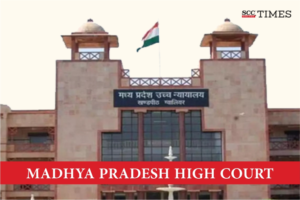Madhya Pradesh High Court: In a writ petition filed seeking the quashment of Judicial Magistrate’s order dated 10-08-2023 which directed the police to register an FIR under Section 156(3) of CrPC and quashment of original complaint dated 23-01-2023, a single-judge bench of Sanjay Dwivedi, J., quashed the impugned order and the complaint, emphasising on the misuse of judicial processes and non-disclosure of material facts.
In the instant matter, the impugned complaint originated from an alleged assault incident on 20-11-2021, reported by respondent 2’s father to the Human Rights Commission. An inquiry conducted by the police, as per the Human Rights Commission’s direction, concluded the allegations were false and the incident was accidental. On 23-01-2023, Respondent 2 filed a complaint before the Judicial Magistrate First Class (JMFC), Hanumana, seeking registration of an FIR against the petitioners. Without considering the prior police inquiry, the JMFC passed an order on 10-08-2023 directing the police to register an FIR against the petitioners.
The petitioners alleged suppression of material facts and submission of a false affidavit by the complainant and thereby, misleading the Court. It was contended that the police inquiry report concluded the allegations as false. It was contended that the JMFC’s order directing registration of an FIR was issued without proper application of mind, violating principles laid down in Priyanka Srivastava v. State of U.P., (2015) 6 SCC 287. The petitioners referred to precedents and contended that suppression of material facts and lack of bona fide intention justify quashing of complaints filed under Section 156(3) CrPC. It was lastly contended that the present writ petition is maintainable under Article 226 due to abuse of process of law.
However, respondent 2 contended that the present writ petition is not maintainable under Article 226, as remedies are available under Section 397 of the CrPC via revision. It was contended that the police’s failure to register an FIR for a cognizable offense justified filing the complaint under Section 156(3) CrPC, as per Lalita Kumari v. Govt. of U.P., (2014) 2 SCC 1. It was contended that the alleged suppression of material facts does not invalidate the complaint and JMFC’s order does not qualify as abuse of process.
The Court stated that the Magistrate is expected to act judiciously and ensure proper application of mind under Section 156(3) of the CrPC while directing an FIR registration, as emphasized in Priyanka Srivastava (Supra). The Court stated that suppression of the earlier inquiry by the complainant raises questions about the bona fide of the complaint. The Court asserted that submission of an affidavit is meant to prevent misuse of legal procedures. The Court held that the complainant’s suppression of facts and filing of a false affidavit constituted abuse of judicial process.
“In a petition filed under Article 226 of the Constitution of India, the High Court has ample power to restrain the abuse of process of law and as such this Court is of the opinion that the complaint filed by the respondent is nothing but a misuse of the forum only to harass the petitioners and this amounts to abuse of process of law.”
The Court upheld the petitioners’ right to seek redressal under Article 226 for addressing procedural abuse and preventing injustice. The Court quashed the impugned order of the JMFC dated 10.08.2023 and the complaint under Section 156(3) CrPC, stating that the complainant had not approached the court with clean hands.
[Brijendra Kumar Patel v. State of M.P., 2024 SCC OnLine MP 7544, Decided on 25-10-2024]
Advocates who appeared in this case:
Shri Sankalp Kochar, Counsel for the Petitioners
Smt. Shraddha Tiwari, Counsel for the Respondent/State
Shri Utkarsh Agrawal, Counsel for the Respondent No. 2


